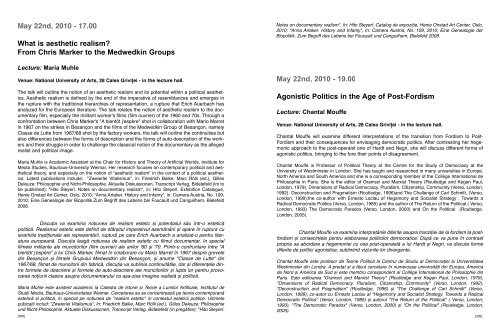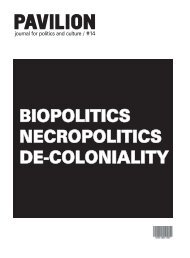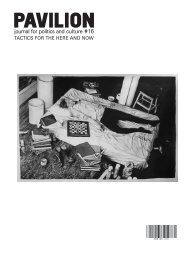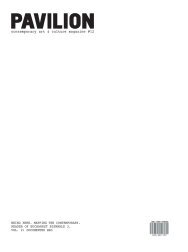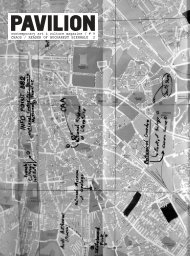PAVILION
PAVILION
PAVILION
- No tags were found...
Create successful ePaper yourself
Turn your PDF publications into a flip-book with our unique Google optimized e-Paper software.
What is aesthetic realism?<br />
From Chris Marker to the Medwedkin Groups<br />
Notes on documentary realism", în: Hito Steyerl. Catalog de expoziție, Henie Onstad Art Center, Oslo,<br />
2010; “Anna Artaker. History and Infamy”, în: Camera Austria, No. 109, 2010; Eine Genealogie der<br />
Biopolitik. Zum Begriff des Lebens bei Foucault und Canguilhem, Bielefeld 2008.<br />
Lecture: Maria Muhle<br />
Venue: National University of Arts, 28 Calea Griviței - in the lecture hall.<br />
The talk will outline the notion of an aesthetic realism and its potential within a political aesthetics.<br />
Aesthetic realism is defined by the end of the imperative of resemblances and emerges in<br />
the rupture with the traditional hierarchies of representation, a rupture that Erich Auerbach has<br />
analyzed for the European literature. The talk relates the notion of aesthetic realism to the documentary<br />
film, especially the militant worker's films (film ouvrier) of the 1960 and 70s. Through a<br />
confrontation between Chris Marker's "A bientôt j'espère" shot in collaboration with Mario Marret<br />
in 1967 on the strikes in Besançon and the films of the Medwedkin Group of Besançon, namely<br />
Classe de Lutte from 1967/68 shot by the factory workers, the talk will outline the continuities but<br />
also differences between the forms of description and the forms of auto-description of the workers<br />
and their struggle in order to challenge the classical notion of the documentary as the alleged<br />
realist and political image.<br />
Maria Muhle is Academic Assistant at the Chair for History and Theory of Artificial Worlds, Institute for<br />
Media Studies, Bauhaus-University Weimar. Her research focuses on contemporary political and aesthetical<br />
theory, and especially on the notion of “aesthetic realism” in the context of a political aesthetics.<br />
Latest publications include: "Zweierlei Vitalismus", in: Friedrich Balke, Marc Rölli (ed.), Gilles<br />
Deleuze: Philosophie und Nicht-Philosophie. Aktuelle Diskussionen, Transcript Verlag, Bidelefeld (im to<br />
be published); "Hito Steyerl. Notes on documentary realism", in: Hito Steyerl. Exhibition Catalogue,<br />
Henie Onstad Art Center, Oslo, 2010; “Anna Artaker. History and Infamy”, in: Camera Austria, No. 109,<br />
2010; Eine Genealogie der Biopolitik.Zum Begriff des Lebens bei Foucault und Canguilhem, Bielefeld<br />
2008.<br />
Discuția va examina noțiunea de realism estetic și potențialul său într-o estetică<br />
politică. Realismul estetic este definit de sfârșitul imperativul asemănării și apare în ruptura cu<br />
ierarhiile tradiționale ale reprezentării, ruptură pe care Erich Auerbach a analizat-o pentru literatura<br />
europeană. Discuția leagă noțiunea de realism estetic cu filmul documentar, în special<br />
filmele militante ale muncitorilor (film ouvrier) ale anilor '60 și '70. Printr-o confruntare între "A<br />
bientôt j'espère" a lui Chris Marker, filmat în colaborare cu Mario Marret în 1967 despre grevele<br />
din Besançon și filmele Grupului Medwedkin din Besançon, și anume "Classe de Lutte" din<br />
1967/68, filmat de muncitorii din fabrică, discuția va sublinia continuitățile, dar și diferențele dintre<br />
formele de descriere și formele de auto-descriere ale muncitorilor și lupta lor pentru provocarea<br />
noțiunii clasice asupra documentarului ca așa-zisa imagine realistă și politică.<br />
Maria Muhle este asistent academic la Catedra de Istorie și Teorie a Lumilor Artificale, Institutul de<br />
Studii Media, Bauhaus-Universitatea Weimar. Cercetarea sa se concentrează pe teoria contemporană<br />
estetică și politică, în special pe noțiunea de "realism estetic" în contextul esteticii politice. Ultimele<br />
pubicații includ: "Zweierlei Vitalismus", în: Friedrich Balke, Marc Rölli (ed.), Gilles Deleuze: Philosophie<br />
und Nicht-Philosophie. Aktuelle Diskussionen, Transcript Verlag, Bidelefeld (în pregătire); "Hito Steyerl.<br />
Agonistic Politics in the Age of Post-Fordism<br />
Lecture: Chantal Mouffe<br />
Venue: National University of Arts, 28 Calea Griviței - in the lecture hall.<br />
Chantal Mouffe will examine different interpretations of the transition from Fordism to Post-<br />
Fordism and their consequences for envisaging democratic politics. After contrasting her hegemonic<br />
approach to the post-operaist one of Hardt and Negri, she will discuss different forms of<br />
agonistic politics, bringing to the fore their points of disagreement.<br />
Chantal Mouffe is Professor of Political Theory at the Centre for the Study of Democracy at the<br />
University of Westminster in London. She has taught and researched in many universities in Europe,<br />
North America and South America and she is a corresponding member of the Collège International de<br />
Philosophie in Paris. She is the editor of Gramsci and Marxist Theory (Routledge and Kegan Paul,<br />
London, 1979), Dimensions of Radical Democracy. Pluralism, Citizenship, Community (Verso, London,<br />
1992) Deconstruction and Pragmatism (Routledge, 1996)and The Challenge of Carl Schmitt, (Verso,<br />
London, 1999);the co-author with Ernesto Laclau of Hegemony and Socialist Strategy . Towards a<br />
Radical Democratic Politics (Verso, London, 1985) and the author of The Return of the Political ( Verso,<br />
London, 1993) The Democratic Paradox (Verso, London, 2000) and On the Political (Routledge.<br />
London, 2005).<br />
Chantal Mouffe va examina interpretările diferite asupra tranziției de la fordism la postfordism<br />
și consecințele pentru elaborarea politicilor democratice. După ce va pune în contrast<br />
propria sa abordare a hegemoniei cu cea post-operaistă a lui Hardt și Negri, va discuta forme<br />
diferite de politici agonistice, subliniind viziunile lor divergente.<br />
Chantal Mouffe este profesor de Teorie Politică la Centrul de Studiu al Democrației la Universitatea<br />
Westminster din Londra. A predat și a făcut cercetare în numeroase universități din Europa, America<br />
de Nord și America de Sud și este membru corespondent al Collège International de Philosophie din<br />
Paris. Este editoarea "Gramsci and Marxist Theory" (Routledge and Kegan Paul, London, 1979),<br />
"Dimensions of Radical Democracy. Pluralism, Citizenship, Community" (Verso, London, 1992),<br />
"Deconstruction and Pragmatism" (Routledge, 1996) și "The Challenge of Carl Schmitt" (Verso,<br />
London, 1999); co-autor cu Ernesto Laclau al "Hegemony and Socialist Strategy. Towards a Radical<br />
Democratic Politics" (Verso, London, 1985) și autorul "The Return of the Political" ( Verso, London,<br />
1993), "The Democratic Paradox" (Verso, London, 2000) și "On the Political" (Routledge. London,<br />
2005).<br />
[508] [509]


